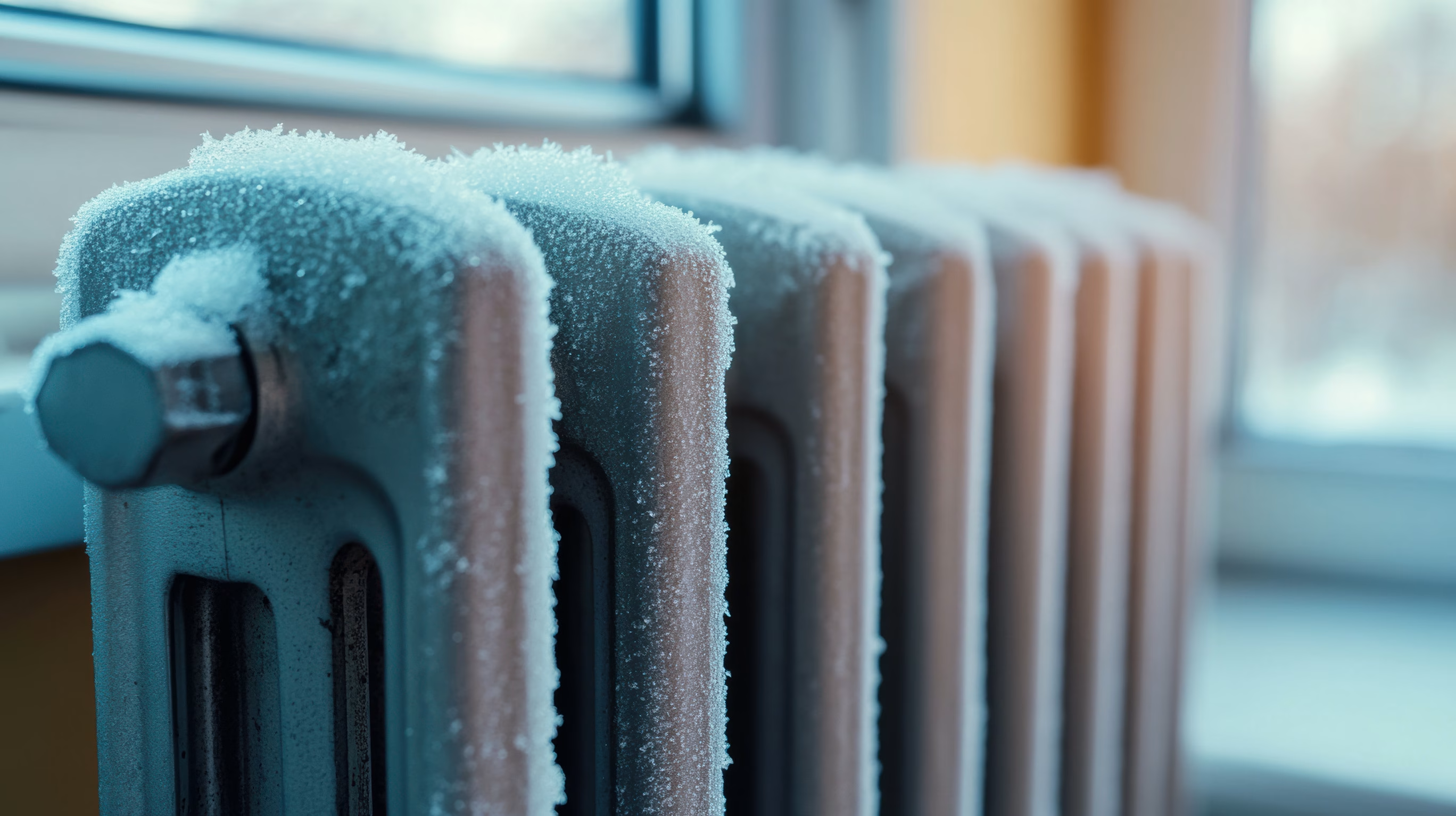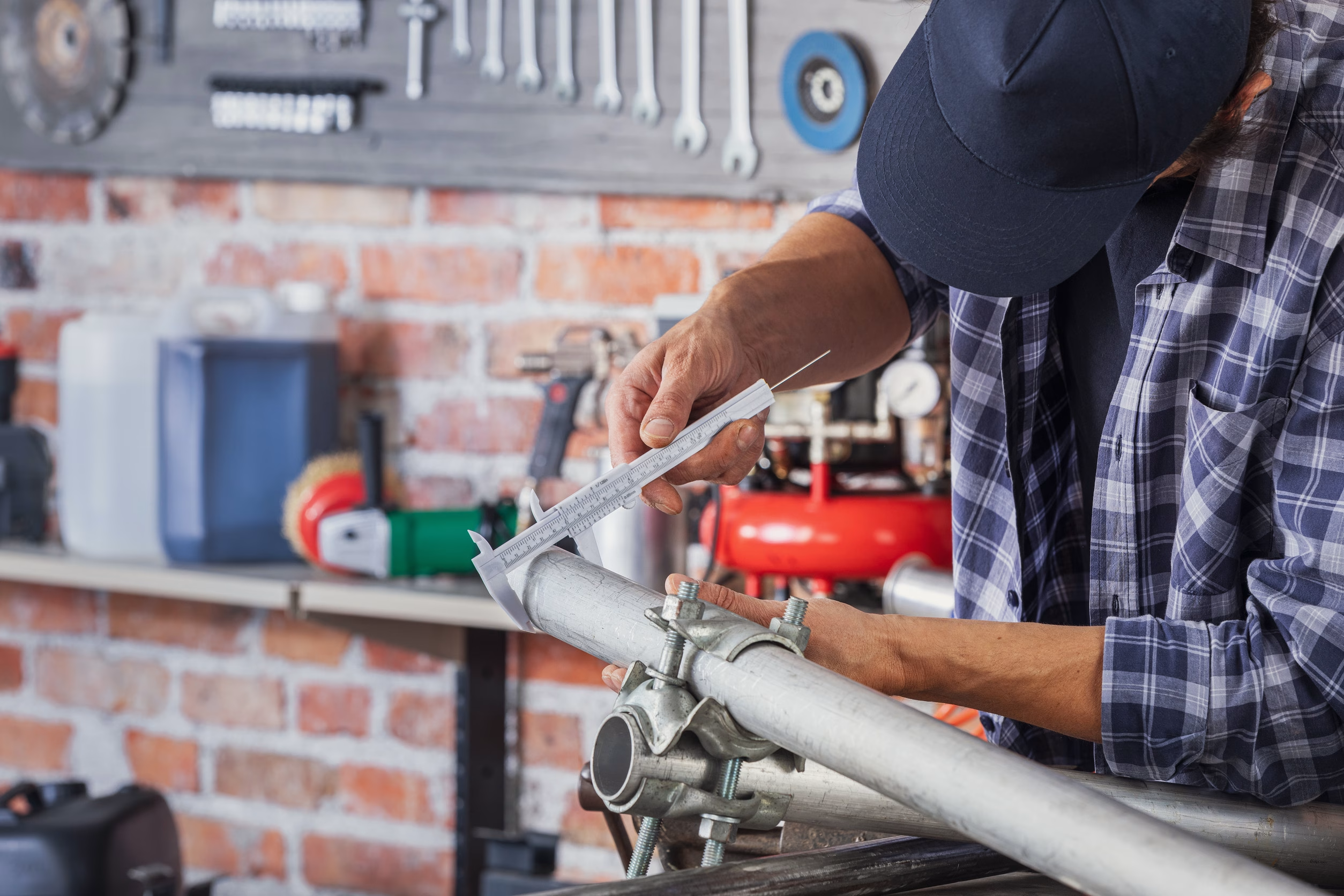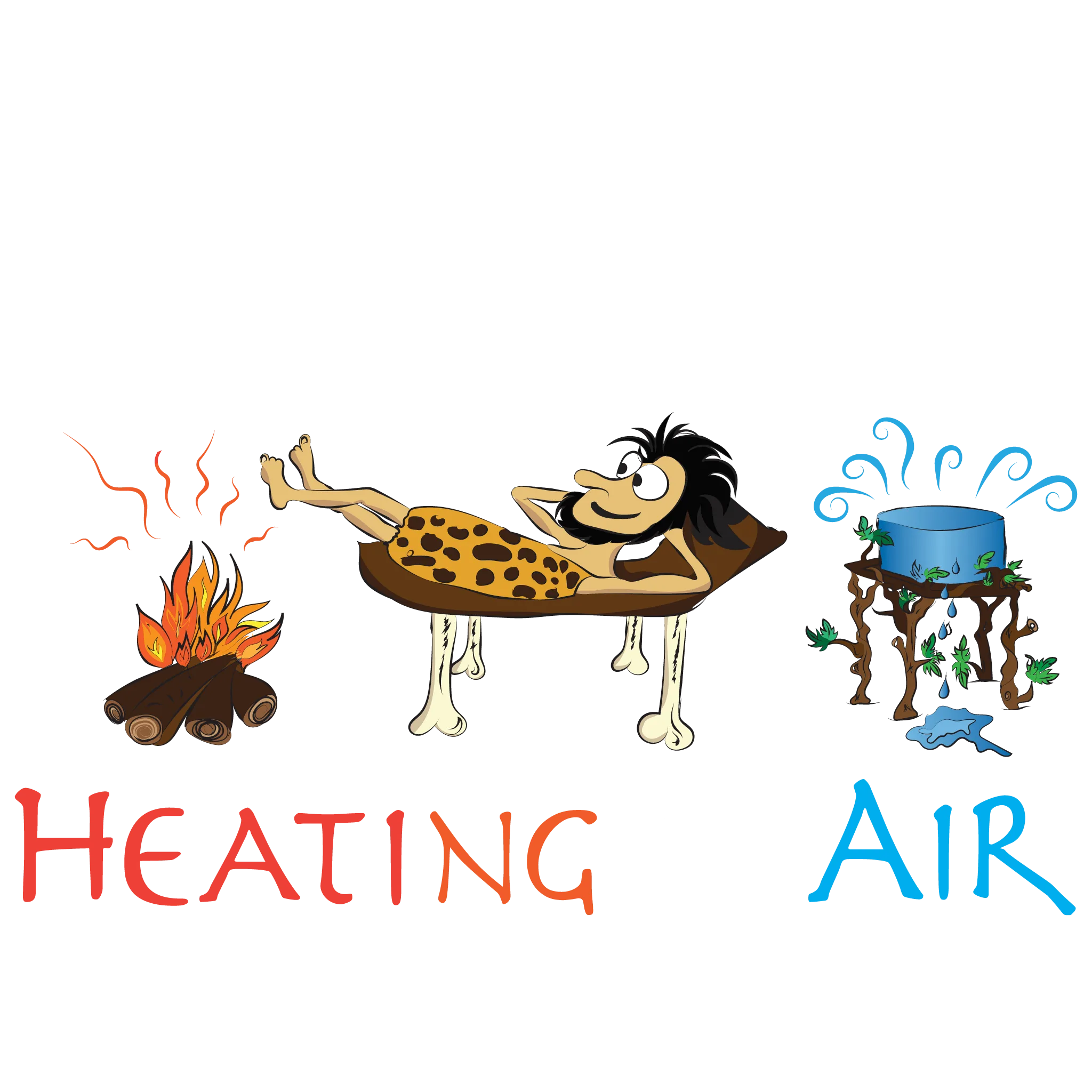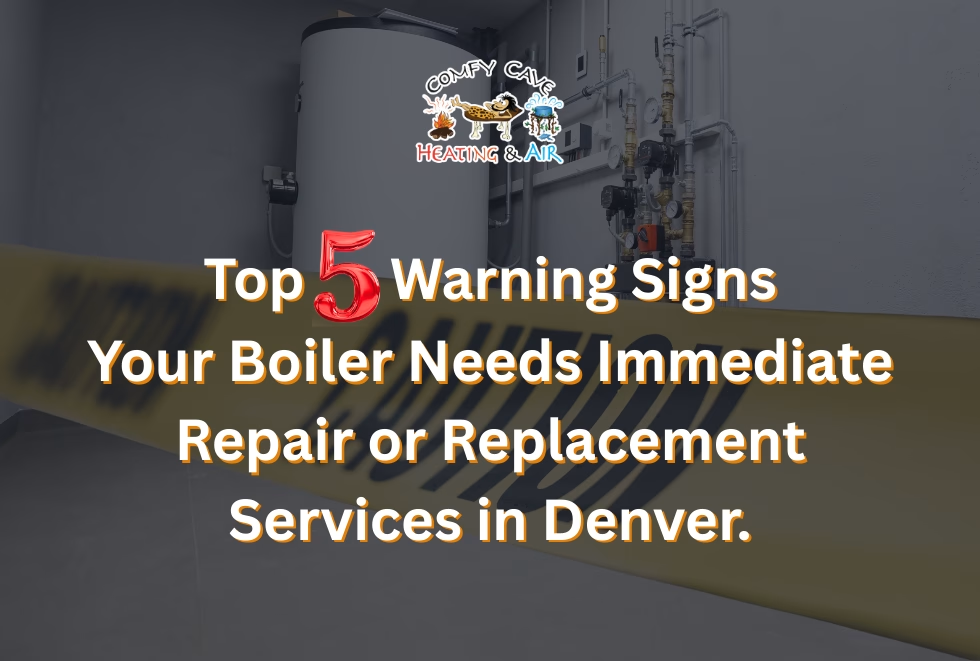A reliable boiler is essential for year-round comfort in Denver’s unpredictable climate, yet many homeowners overlook early indicators of trouble until a full breakdown occurs. Recognizing urgent boiler warning signs can prevent cold patches, high energy bills, and safety risks. In this guide, you’ll discover:
- The five most critical malfunction signals every boiler exhibits
- Proven diagnostic methods to pinpoint leaks, pressure issues, noises, and gas hazards
- Criteria for choosing repair versus replacement in Denver
- Preventive maintenance tasks that extend boiler lifespan
- Why Comfy Cave Heating & Air stands out for expert boiler care and transparent service
Armed with this information, you can act swiftly and confidently to restore safe, efficient heating with Denver’s trusted HVAC professionals.
What Are the Most Common Warning Signs That Your Boiler Needs Repair or Replacement?

Boiler warning signs represent symptoms of underlying failures in your heating system. Early detection of these signals—before they escalate—saves time, money, and discomfort. The five critical indicators include unusual noises, water leaks, pressure fluctuations, inconsistent heating, and hazardous gas smells.
- Unusual mechanical or kettling noises from the boiler
- Visible leaking or dripping around boiler components
- Low or rapidly changing water pressure on the gauge
- Absence of heat or uneven warmth in radiators
- Strange odors or carbon monoxide detector alerts
Spotting any of these warning signs should prompt immediate assessment to avoid costly breakdowns or safety hazards.
How Can Unusual Noises Like Banging or Kettling Indicate Boiler Problems?
Unusual boiler noises such as banging, kettling, or gurgling often signal internal scale buildup or trapped air that disrupts normal water flow. Rapid temperature changes within the heat exchanger produce kettling sounds, while loose components or sediment can cause loud clanks.
Common causes of boiler noises:
- Limescale Buildup in heat exchanger fins
- Air Pockets restricting water circulation
- Faulty Circulator Pump bearings
- Sediment accumulation at low points
Boiler Noises and Their Causes
Unusual noises from a boiler, such as banging or kettling, often indicate internal issues like limescale buildup or trapped air, which can disrupt water flow and reduce efficiency.
Kettling and banging diminish heat transfer efficiency and stress boiler parts, increasing the likelihood of leaks or pump failure. Addressing these noise symptoms early restores smooth operation and prevents more severe damage.
What Does Leaking or Dripping Water Reveal About Boiler Condition?
Water escaping from seals, joints, or valves indicates corrosion, worn gaskets, or excessive system pressure that compromises boiler integrity. Even minor drips can accelerate metal degradation and promote internal rust.
Potential leak sources:
- Corroded Pipe Fittings or boiler shell
- Faulty Seals and O-rings at connections
- Overpressurized System forcing water past relief valves
- Cracked Heat Exchanger casting
- Pump Seal Failure around the circulator
Persistent leaks demand prompt repair, since ongoing moisture accelerates component failure and poses flood risks in mechanical rooms.
Common Causes of Boiler Leaks
Water leaks around boiler components can signal corrosion, worn gaskets, or excessive system pressure, potentially leading to metal degradation and internal rust.
How Do Low or Fluctuating Boiler Pressure Symptoms Signal Malfunction?
Maintaining proper boiler pressure—typically between 1 and 1.5 bar when cold—is crucial for safe, efficient operation. Pressure drops below 1 bar often mean hidden leaks or air infiltration, while spikes above 2.5 bar stress relief valves and seals.
| Pressure Level | Normal Range | Likely Cause |
| Below 1 bar | 1 – 1.5 bar |
System Leak or Air Entry |
| 1.5 – 2 bar | 1 – 1.5 bar |
Recent Radiator Bleed |
| Above 2.5 bar |
1 – 1.5 bar |
Faulty Relief Valve |
Boiler Pressure Fluctuations
Maintaining proper boiler pressure, typically between 1 and 1.5 bar when cold, is crucial for safe and efficient operation; pressure drops or spikes can indicate leaks or valve issues.
Why Does No Heat or Inconsistent Heating Mean Your Boiler Needs Attention?
Continuous workshops and courses sponsored by manufacturers keep technicians up-to-date on variable-speed compressors, smart thermostats, and new refrigerants.
- Hands-on practice sessions hone skills in leak detection and refrigerant recovery.
- Updates from manufacturers on energy-efficient equipment ensure optimal SEER and COP ratings.
- Safety refreshers cover essential procedures like electrical lock-out/tag-out and carbon monoxide testing.
These training areas lead to quicker, more accurate repairs and installations, reducing callbacks and extending system life.
What Are the Risks of Strange Smells or Carbon Monoxide Detector Alarms?
Odors of rotten eggs or musty gas near the boiler highlight combustion inefficiency or a gas leak—conditions that can emit carbon monoxide, a colorless, odorless killer. Immediate action is critical to protect occupants from poisoning.
Carbon Monoxide Risks
Strange smells or carbon monoxide detector alarms near a boiler can indicate combustion inefficiency or a gas leak, which can emit carbon monoxide, a dangerous and potentially fatal gas.
Common sources of hazardous fumes:
- Natural Gas Leak from damaged piping or fittings
- Incomplete Combustion inside the burner assembly
- Blocked or Faulty Flue preventing proper exhaust
Never ignore a carbon monoxide alarm. Evacuate the area, ventilate, and contact qualified technicians to perform safety inspections and repairs before restarting the system.
How Do You Diagnose These Boiler Warning Signs Effectively?
Diagnosing boiler symptoms relies on systematic checks, specialized tools, and logical troubleshooting steps that isolate root causes without guesswork.
- Visual inspections to locate leaks and corrosion spots
- Pressure gauge monitoring to track fluctuations
- Acoustic listening for source of unusual sounds
- Carbon monoxide detectors and flue analyzers for gas safety
A methodical diagnostic approach ensures accurate identification of faults, reducing repair time and unexpected costs.
What Tools and Methods Are Used to Identify Boiler Leaks and Their Causes?
Leak diagnosis uses moisture detection and pressure tests that pinpoint exact failure points within the boiler or piping network.
- Infrared Camera scans cold spots where moisture absorbs heat differently
- Pressure Test Pump pressurizes the system to reveal hidden drips
- Moisture Meter measures humidity around seals and joints
- Dye Injection highlights hairline cracks in heat exchanger
These methods minimize invasive disassembly and verify that repairs target the true leak source.
How Can You Check Boiler Pressure and Understand Its Fluctuations?
- Turn off the heating and wait for the boiler to cool.
- Note current pressure gauge reading against manufacturer’s chart.
- Adjust via filling loop if below 1 bar, or drain system if above 2 bar.
- Track changes after each heating cycle to detect persistent drifts.
Consistent documentation of pressure patterns uncovers slow leaks or failing relief valves before they force shutdowns.
What Causes Strange Boiler Noises and How Are They Diagnosed?
Boiler noise diagnosis combines auditory examination with component testing to determine whether sounds stem from scaling, air, or mechanical wear.
- Ultrasonic listening device captures high-frequency bearing whine
- Flow meter checks water circulation rate against specs
- Scale test strips assess limescale accumulation inside heat exchanger
- Vibration analysis identifies motor or pump imbalance
By matching sound signatures to known fault profiles, experts quickly isolate and correct the underlying issue.
How Is Carbon Monoxide Risk Detected and What Safety Measures Are Needed?
Safety protocols for gas hazards rely on detection devices and flue inspections to guarantee complete combustion and proper exhaust.
- Install battery-operated carbon monoxide detectors near boiler and living spaces
- Perform annual flue sweep to remove blockages and verify draft
- Use combustion analyzer to measure flue gas CO levels and combustion efficiency
- Maintain clear ventilation paths around boiler enclosure
These measures protect occupants and maintain compliance with local safety codes.
When Should You Choose Boiler Repair Versus Replacement in Denver?
Deciding between repair and replacement depends on the boiler‘s age, repair cost relative to a new installation, efficiency gains, and reliability needs.
| Decision Factor | Repair Option | Replacement Option |
| Boiler Age | Less than 10 years | Older than 10–15 years |
| Repair Cost | Under 50% of new boiler price | Exceeds 50% of a comparable new unit |
| Efficiency Rating | 80% AFUE or higher | Modern condensing boilers exceed 90% AFUE |
| Breakdown Frequency | Infrequent, isolated issues | Recurring failures impacting comfort |
| Parts Availability | OEM parts accessible | Obsolete or discontinued components |
Boiler Repair vs. Replacement
Deciding between boiler repair and replacement depends on factors like the boiler‘s age, repair costs, efficiency, and the frequency of breakdowns.
What Factors Determine If Repair Is the Best Option for Your Boiler?
Minor malfunctions, recent installations, and cost-effective fixes often favor repair over full replacement when:
- Boiler is under 10 years old and meets current efficiency standards
- Parts are readily available without long lead times
- Repair expenses remain below half the price of a new unit
- Warranty coverage still applies to major components
Opting for repair sustains system continuity at minimal expense when conditions are favorable.
When Is Boiler Replacement More Cost-Effective Than Repair?
Investing in a new boiler becomes prudent when repair costs escalate or efficiency losses erode savings:
- Repair quotes approach or exceed 50% of a new boiler installation
- Regular breakdowns demand repeated service calls
- Older boilers operate below 80% AFUE, driving up fuel bills
- Modern incentives or rebates offset installation expenses
A replacement unlocks improved energy performance that recoups investment through lower utility costs.

How Does Boiler Efficiency Impact the Repair or Replacement Decision?
Efficiency dictates both operating cost and carbon footprint. Older non-condensing boilers average 70–80% AFUE, while condensing models exceed 90% AFUE, reducing fuel consumption by up to 30%.
| Boiler Age | Typical AFUE | Impact on Bills |
| 10–15 years | 70 – 80% AFUE | Higher fuel usage and emissions |
| New condensing | 90 – 95% AFUE | Lower operating costs and carbon |
Boiler Efficiency and AFUE
Boiler efficiency is measured by Annual Fuel Utilization Efficiency (AFUE), with modern condensing boilers exceeding 90% AFUE, reducing fuel consumption.
What Are Typical Repair and Replacement Costs in the Denver Metro Area?
Understanding local price ranges helps homeowners budget for either service or new installation in Denver’s market.
| Service Type | Average Cost | Price Range |
| Minor Repair (parts & labor) | $300 | $150 – $600 |
| Major Repair (heat exchanger) | $1,200 | $800 – $1,800 |
| New Boiler Installation |
$7,361 | $4,150 – $10,772 |
Denver Boiler Repair Costs
In Denver, boiler repair costs can vary, with minor repairs averaging around $300 and major repairs potentially costing $1,200, while new boiler installations average around $7,361.
How Can Preventive Maintenance Help Avoid These Critical Boiler Warning Signs?
Preventive maintenance combines periodic inspections and tune-ups to catch small faults before they become major malfunctions. Regular care sustains efficiency, extends component life, and reduces emergency repair rates.
Preventive Maintenance for Boilers
Preventive maintenance, including inspections and tune-ups, helps catch small faults before they become major problems, sustaining efficiency and extending component life.
What Routine Maintenance Tasks Keep Your Boiler Running Smoothly?
A consistent maintenance schedule addresses wear points, calibration needs, and cleanliness to optimize performance.
- Annual professional tune-up including burner clean and combustion test
- Pressure check and adjustment to maintain 1 – 1.5 bar cold fill
- Radiator bleeding to remove trapped air that can cause kettling
- Flue and vent inspection to clear soot and ensure safe exhaust
- Water treatment to prevent limescale accumulation
These tasks enhance efficiency, lower fuel usage, and prevent early warning signs from developing.
How Does Regular Inspection Prevent Leaks, Pressure Issues, and Noises?
Systematic checks reveal loose fittings, worn seals, and scaling before they trigger noticeable symptoms.
- Visual examination of pipe joints and heat exchanger surfaces
- Seal integrity tests under operating pressure
- Vibration and noise assessment of pumps and motors
- Water quality sampling for corrosive elements
Proactive inspections stop small issues from evolving into leaks, drastic pressure swings, or disruptive noises.
What Emergency Repair Services Are Available for Sudden Boiler Failures?
Comfy Cave Heating & Air offers 24/7 emergency support to restore heating and hot water without delay.
- Rapid-response diagnostics within hours of call
- On-the-spot parts replacement and repair
- Temporary heating solutions to minimize discomfort
- Comprehensive follow-up inspection to confirm stability
Emergency readiness ensures you won’t endure extended cold spells during Denver’s chilliest nights.
Why Choose Comfy Cave Heating & Air for Boiler Repair and Replacement in Denver?
When your boiler shows critical symptoms, you need a partner with local expertise, transparent pricing, and proven results. Comfy Cave Heating & Air delivers tailored solutions crafted for Denver’s altitude and climate challenges.
What Makes Comfy Cave’s Local Expertise Unique for Denver Boilers?
Comfy Cave technicians understand how altitude and hard water affect boiler operation in the Mile High City. Our climate-specific approach includes:
- Proper system sizing to account for rapid temperature swings
- Altitude-calibrated combustion settings for safe, efficient burn
- Recommendations for water treatment to curb local limescale
This localized knowledge maximizes system longevity and homeowner satisfaction.
How Do Certified Technicians Diagnose and Fix Boiler Problems?
Our team comprises NATE-certified professionals equipped with advanced diagnostic tools and OEM parts to ensure precision repairs and lasting results.
- Infrared inspection for hidden leaks
- Combustion analysis to optimize efficiency
- OEM heat exchanger and valve replacements
- System performance tuning and safety testing
Certified expertise guarantees repairs, restore full capacity and compliance with industry standards.
What Transparent Pricing and Financing Options Does Comfy Cave Offer?
Comfy Cave provides clear, upfront quotes and flexible financing to spread installation or repair costs over time.
- Flat-rate labor plus itemized parts list
- 0% interest financing for qualified applicants
- Seasonal promotions and local rebate guidance
Transparent pricing means no surprise fees, and financing options make upgrades more accessible.
How Can You Schedule a Boiler Service or Get a Quote from Comfy Cave?
Arranging expert boiler care is simple:
- Call our Denver office at (303) 645-4889 to speak with a heating specialist
- Use our online request form at https://comfycave.com/contact-us/ for convenient scheduling
- Email comfycave@gmail.com to receive a detailed quote
Prompt service booking ensures your boiler returns to safe, efficient operation without delay.
Prompt action at the first sign of boiler distress preserves comfort, avoids costly breakdowns, and safeguards your home. Trust Comfy Cave Heating & Air in Denver to diagnose issues, recommend the best course of action, and deliver professional repairs or efficient new installations that keep your family warm and secure.

